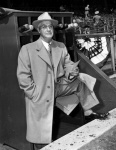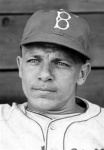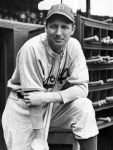Managing the 1947 Dodgers: The “People’s Choice”
This article was written by Lyle Spatz
This article was published in Spring 2013 Baseball Research Journal
Was Burt Shotton the best person to manage the Brooklyn Dodgers in 1947, Jackie Robinson’s historic rookie season? The “People’s Choice” is one person Branch Rickey may not have considered.
The genesis for this article dates back to Chuck Chalberg’s wonderful one-man show as Branch Rickey at the 2012 SABR convention in Minneapolis. Afterward, Chuck asked for questions from the audience and that we address them as if he were actually Rickey. I asked if he had considered anyone besides Burt Shotton to manage the Dodgers in 1947. “Mr. Rickey” said it was a good question, one that he had never been asked, but he had no answer. So I decided to look at who was available to the real Branch Rickey and see if there might have been a better choice than Shotton. Burt Shotton led the Dodgers to the 1947 pennant and took the New York Yankees to seven games in the World Series. So why am I even thinking someone else may have been the better choice? The answer does not lie in the win-loss column, but rather on the playing fields and in the dugouts of the seven other National League cities. We all remember, or have read about, the terrible ordeal suffered by Jackie Robinson from various teams and individuals around the league. No manager could have fully prevented that, but I’ve often thought how different Robinson’s ordeal would have been had fiery Leo Durocher been his manager that year.
 Durocher was the right man at the right time during spring training, recognizing immediately how good a ballplayer Robinson was. He had defended him with a fierce, profanity-laced outburst when some of his players voiced their opposition to playing with a black man. We can be sure he would have been even more fierce in defending Robinson against the opposition. Every beanball, unnecessarily hard slide, or actual spiking, would have propelled Durocher onto the field demanding the umpires throw the perpetrator out of the game. Based on his previous history, we can be certain he would have ordered retaliatory measures by Brooklyn pitchers and baserunners. Shotton, by contrast, was a non-confrontational man by nature. Moreover, because he managed in street clothes, he was forbidden by rule to even step on the field, much less face up to an umpire or opposing manager or player.
Durocher was the right man at the right time during spring training, recognizing immediately how good a ballplayer Robinson was. He had defended him with a fierce, profanity-laced outburst when some of his players voiced their opposition to playing with a black man. We can be sure he would have been even more fierce in defending Robinson against the opposition. Every beanball, unnecessarily hard slide, or actual spiking, would have propelled Durocher onto the field demanding the umpires throw the perpetrator out of the game. Based on his previous history, we can be certain he would have ordered retaliatory measures by Brooklyn pitchers and baserunners. Shotton, by contrast, was a non-confrontational man by nature. Moreover, because he managed in street clothes, he was forbidden by rule to even step on the field, much less face up to an umpire or opposing manager or player.
Commissioner Happy Chandler’s one-year suspension of Durocher for actions detrimental to baseball came one day before the Dodgers signed Robinson to a major-league contract and six days before the season opener. Dodgers president Branch Rickey’s first choice to replace Durocher was Joe McCarthy, the long-time Yankees’ manager who had resigned in early 1946. When McCarthy turned him down, Rickey offered the position to coach Clyde Sukeforth, who had recommended Robinson. Sukeforth agreed to manage the club until Rickey could find a permanent manager, saying he preferred to remain a coach. On April 18, the Dodgers announced the hiring of Shotton, Rickey’s old friend and frequent employee. We all know how important it was to Branch Rickey for Robinson to succeed, so the question is, did Rickey make the best managerial choice in ensuring Robinson’s success?
Shotton appeared as surprised as anyone to find himself managing the Dodgers. He was 62 years old and hadn’t been a full-time manager since being fired by the Philadelphia Phillies in 1933, after six unsuccessful seasons. He was completely unfamiliar with his new team, and there were hardly any National League players still around that he had managed or managed against. The only National League manager remaining from 1933 was Charlie Grimm of the Chicago Cubs. So my question is, why did Rickey choose Shotton?
Durocher had told his players they were good enough to win the pennant no matter who Rickey got to replace him, but why Shotton? Did he consider anyone else, someone more familiar with not only Brooklyn’s players, but the National League as a whole? Let’s look at some of the available possibilities, both in the Dodgers system and elsewhere. Among those already under contract were Ray Blades, Clay Hopper, and Jake Pitler. Blades, like Shotton, had a long history with Rickey, dating back to their days with the St. Louis Cardinals. He had been hired to replace the departed Charlie Dressen, Durocher’s assistant manager, a role we now call a “bench coach.” When the suspension was announced, the New York press assumed he would be the new manager.
“Durocher Suspended for Season: Blades Likely to Take over Job,” was the headline in the New York Post. Hopper, a Mississippian, had managed Robinson at Montreal in 1946, and despite his initial opposition to having a black player, he had come to admire and respect Robinson’s talent and character. Under Hopper’s leadership, Robinson won the International League batting championship, and the Royals won the Junior World Series Pitler had been managing in the Brooklyn farm system since 1939 and been instrumental in the development of future Dodgers Duke Snider, Ralph Branca, and Clem Labine. Additionally, Pitler had looked after Robinson during spring training and was one of the rookie’s strongest boosters.
 Among those available who were not in Rickey’s employ were former managers Frankie Frisch, Luke Sewell, and Freddie Fitzsimmons. Frisch and Sewell were experienced managers, who had won pennants, and in Frisch’s case a World Series. Both men had been let go during the 1946 season: Frisch by the Pittsburgh Pirates and Sewell by the St. Louis Browns. Fitzsimmons had been fired by the Philadelphia Phillies a year earlier. All three were younger than Burt Shotton.
Among those available who were not in Rickey’s employ were former managers Frankie Frisch, Luke Sewell, and Freddie Fitzsimmons. Frisch and Sewell were experienced managers, who had won pennants, and in Frisch’s case a World Series. Both men had been let go during the 1946 season: Frisch by the Pittsburgh Pirates and Sewell by the St. Louis Browns. Fitzsimmons had been fired by the Philadelphia Phillies a year earlier. All three were younger than Burt Shotton.
Other former big league managers serving as coaches and possibly available were Bill McKechnie and Del Baker. McKechnie had 25 years of major-league managerial experience, including four pennants and two world championships. He had been fired by the Cincinnati Reds at the end of the previous season and had signed on as a coach with the Cleveland Indians. Baker, who’d won a pennant with the 1940 Tigers, was a coach for the Boston Red Sox. McKechnie and Baker were also younger than Burt Shotton.
Supposedly, one of the reasons for McCarthy’s lack of interest in the Brooklyn job was that Rickey could not guarantee him more than the one year Durocher would be gone. That might also have been a factor in attempting to sign Frisch, Sewell, and Fitzsimmons; although none had McCarthy’s reputation or the comfort of knowing he could have almost any managerial job he wanted. McKechnie and Baker were under contract to other clubs, an obstacle Rickey easily could have overcome. Most organizations allow a coach to move on to an offered managerial job.
We don’t know if Rickey even considered any of these former major-league managers, or even any of his own coaches, except for Sukeforth. What is intriguing is whether he ever considered any of the three leaders he had on his own roster, already under contract for as long as he wanted them. Player-managers were no longer as plentiful as they had been in earlier decades, but at the start of the 1947 season Mel Ott and Lou Boudreau were filling that role for the Giants and Indians, respectively. Joe Cronin was only two years removed from being the Red Sox playing-manager.
Boudreau and Cronin were shortstops, as was Pee Wee Reese, a player who was well-liked and respected by his teammates. Reese had been the least resistant among the Dodgers’ Southern contingent to playing with Robinson and had befriended him early on. Rickey thought so highly of Reese’s leadership qualities, he would later appoint him as the Dodgers’ team captain.
Second baseman Eddie Stanky had overcome some early doubt and fully accepted Robinson as a teammate. He quickly recognized not only Robinson’s talent, but that the competitive spirit that burned in him was much like his own. Aware that Robinson could not fight back against his tormentors, Stanky, the man closest to him on the field, would not have let the hard slides and attempted spikings Robinson received go unanswered.
 There is no need to go through all the verbal abuse directed at Robinson in 1947. Let’s just focus on the first series against Philadelphia, in the second week of the season, to serve as a symbol for all the rest. Robinson later called this series his worst experience of the season. Led by manager Ben Chapman, the Phillies attacked Robinson with a steady stream of vile racial insults. An outraged Stanky called Chapman a coward and dared him to pick on somebody who can fight back. Stanky was clearly managerial material. Five years later he was the player-manager for the St. Louis Cardinals, the start of a successful seven-year managerial career.
There is no need to go through all the verbal abuse directed at Robinson in 1947. Let’s just focus on the first series against Philadelphia, in the second week of the season, to serve as a symbol for all the rest. Robinson later called this series his worst experience of the season. Led by manager Ben Chapman, the Phillies attacked Robinson with a steady stream of vile racial insults. An outraged Stanky called Chapman a coward and dared him to pick on somebody who can fight back. Stanky was clearly managerial material. Five years later he was the player-manager for the St. Louis Cardinals, the start of a successful seven-year managerial career.
Eddie Stanky would have been an excellent choice to manage the 1947 Dodgers; however, I believe Dixie Walker would have been an even better choice. Despite his well-publicized opposition to Robinson joining the Dodgers, Walker was, above all, a professional. Like all the Dodgers, once the season began he accepted Robinson as a teammate. He did so not out of any sense of social conscience, but the quick realization that the rookie’s exceptional talent and his strength of character could be a key contributor in helping Brooklyn win the pennant. That meant more money for him and all the other Dodgers.
The 36-year-old Walker, a major leaguer since 1931, was among the most respected players in the game. He was the Dodgers’ player representative, and his fellow National Leaguers had chosen him to represent them on a Joint Major League committee organized to deal with issues affecting all the players, such as pensions and benefits.
Dixie Walker was the team’s most popular player, perhaps the most beloved Dodger ever, at least to that time. He was also the undisputed team leader. His acceptance of Robinson would have sent a message to everyone around the league that this black man was a Dodger and we will not tolerate anyone trying to do him harm. Nor would he have sat on the bench and quietly observed the abuse. Walker, a gentle man off the field, had been in several notable brawls throughout his career, including one with several members of the Cubs a year earlier. His most notable brawl had come as a member of the Yankees in a 1933 game at Washington, when he rushed to the defense of his teammate and best friend, Ben Chapman; the same Ben Chapman who 14 years later was directing the attacks on Robinson that first week in April. Walker had not been as vehement in his reaction to the attacks as Stanky, simply telling his old friend to “lay off.” Had he been the manager, he likely would have had more words for Chapman, and they would have carried more weight. Walker, who owned a hardware store in Birmingham, Alabama, had been receiving letters from customers warning of a boycott of the store if he played with “that nigger.”
At a time when players depended on outside income, this was not a threat easily ignored. Yet while Walker never showed any outward signs of friendliness toward his black teammate, he did something more important. Robinson has written of how during an early season slump, Walker corrected his swing and the positioning of his feet. It was valuable advice from a man who later became an outstanding batting coach, and Robinson never forgot it. Walker was never unpleasant to him, Robinson remembered, while describing him as a man of innate fairness.
Becoming a big-league manager was always in Walker’s plans. Rickey thought enough of his teaching and leadership skills to offer him the managing job at Triple-A St. Paul for 1948. Walker preferred to continue as a major league player, and spent the next two seasons with the Pirates. Afterward, he managed for ten seasons in the high minors, compiling a .530 winning percentage, but never got a big league chance.
When Walter O’Malley bought out Rickey after the 1950 season, he fired “Rickey’s man,” Shotton, leading The Sporting News and several other newspapers to predict Walker would be managing the Dodgers in 1951. Instead, O’Malley chose Charlie Dressen, a man with an abrasive personality, no communication skills, and an extremely questionable in-game strategy. The 1951–1953 Dodgers were so strong they won two pennants despite Dressen; they lost a third because of him.
In late October 1950, when Walker was still being considered for the job, a reporter asked Robinson his opinion. It was fine with him, Jackie said, adding that he would not mind playing under Walker. Too bad he didn’t get the chance in 1947. Had Robinson been managed by Walker, one of the most respected men in baseball, one who would have had no hesitation in confronting his tormentors, Robinson’s life would likely have been a lot less burdensome.
LYLE SPATZ has been a member of SABR since 1973 and chairman of the Baseball Records Committee since 1991. His book “1921: The Yankees, the Giants and Battle for Baseball Supremacy in New York,” co-authored with Steve Steinberg, was the winner of the 2011 Seymour Medal, and his “Dixie Walker: A Life in Baseball” was the 2012 winner of the first Ron Gabriel Award. He was the chief editor for “The Team That Forever Changed Baseball and America: The 1947 Brooklyn Dodgers,” released in 2012, and “Bridging Two Dynasties, The 1947 New York Yankees,” released in 2013.


